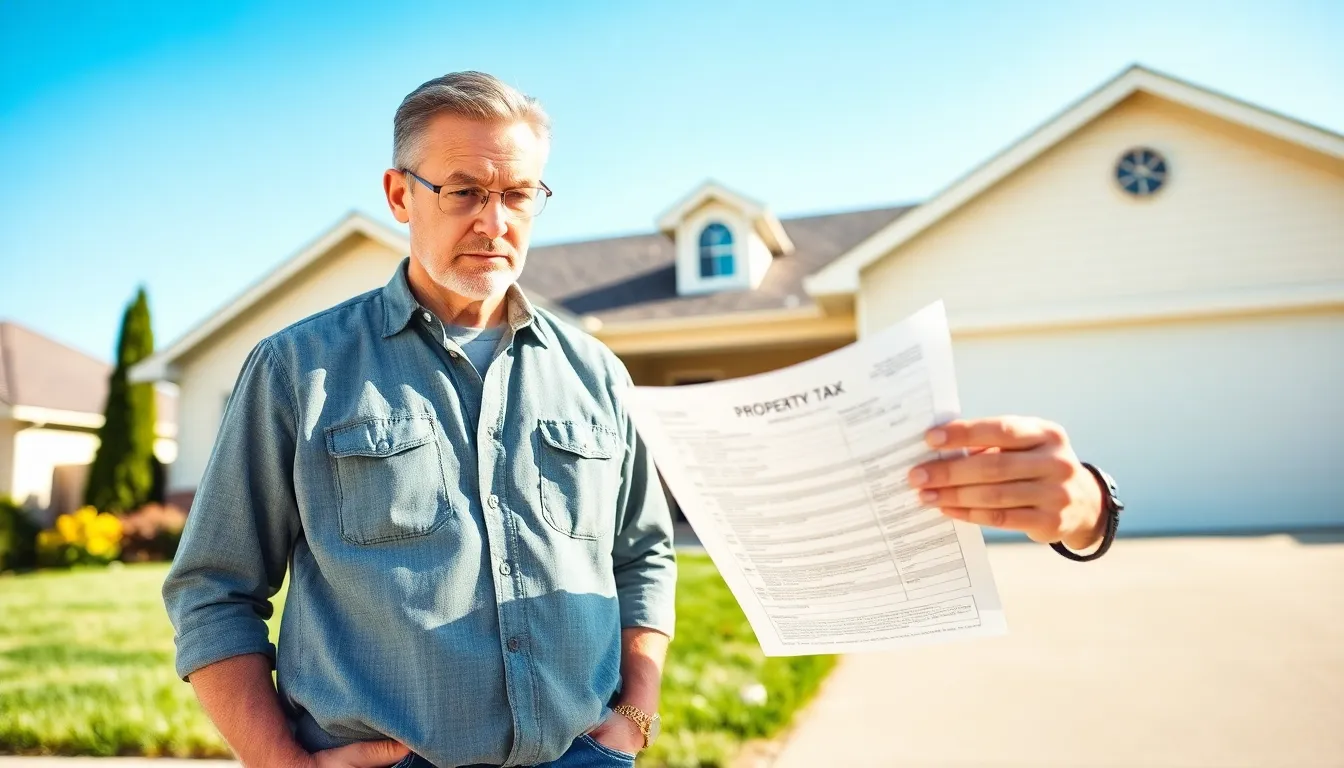Table of Contents
ToggleProperty taxes: the one thing that can turn a dream home into a nightmare faster than you can say “mortgage.” For homeowners and aspiring buyers alike, understanding this financial beast is crucial. It’s not just about paying up; it’s about knowing how it impacts your wallet, your community, and even your sanity.
Imagine waking up to find your property tax bill has skyrocketed overnight—like a surprise party you never wanted. But fear not! With the right knowledge, property taxes can go from a source of dread to a manageable part of homeownership. Dive into the world of property taxes and discover how to navigate this tricky terrain with confidence and maybe even a chuckle or two. After all, who said taxes can’t be fun?
Understanding Property Taxes
Property taxes represent a significant financial obligation for homeowners and buyers. Grasping their implications is crucial for effective financial planning.
Definition of Property Taxes
Property taxes are levies imposed by local governments based on the assessed value of real estate. These taxes fund public services like education, infrastructure, and emergency response. Typically, local authorities determine tax rates annually. Homeowners often receive notices detailing their property’s value and the tax amount owed. Understanding this definition helps residents anticipate and manage these expenses effectively.
Importance of Property Taxes
Property taxes play an essential role in local government funding and community services. They provide necessary resources for schools, roads, and public safety. For homeowners, property taxes directly impact monthly budgets, influencing financial decisions. An increase in property taxes can lead to unplanned expenses, stressing household finances. Staying informed about property tax rates ensures better financial stability. Engaging with local tax assessments can reveal avenues for reducing tax burdens.
Types of Property Taxes

Property taxes vary significantly and typically fall into two main categories: real estate taxes and personal property taxes. Each type plays a role in funding local services and can impact property owners in different ways.
Real Estate Taxes
Real estate taxes apply to land and structures attached to it, including residential homes, commercial buildings, and vacant lots. Local governments often calculate these taxes based on the property’s assessed value, determining a specific tax rate for each area. For example, an assessed value of $200,000 with a tax rate of 1.5% results in an annual tax bill of $3,000. Annual assessments enable municipalities to adjust tax rates based on changing needs and property values. Funding for schools, roads, and public safety derives heavily from these revenues, making understanding real estate taxes essential for homeowners.
Personal Property Taxes
Personal property taxes target movable assets and typically include items like vehicles, machinery, and equipment. Local jurisdictions assess these assets annually to determine value and applicable taxes. For instance, a vehicle worth $25,000 may face a 2% tax, resulting in a $500 liability for the owner. Different states implement diverse regulations governing personal property taxes, leading to variations in how these taxes are calculated and applied. Recognizing these taxes allows individuals to plan effectively and manage their overall financial obligations.
How Property Taxes Are Assessed
Understanding how property taxes are assessed is vital for homeowners and buyers. Local governments evaluate properties to determine their market value, serving as the basis for taxation.
Assessment Process
Each property undergoes a unique assessment process conducted by local tax assessors. First, assessors analyze property characteristics like square footage and location. Next, they compare similar properties within the same area to ascertain market trends. This method ensures assessments reflect current real estate values accurately. Homeowners often receive notices specifying assessed values, allowing them to review and contest as necessary. Engaging with tax assessments can lead to lower tax liabilities if discrepancies are found.
Property Tax Rates
Tax rates vary significantly across different local jurisdictions. Typically, local governments set rates annually, based on budgetary needs and public service funding requirements. These rates may depend on the assessed value of properties in the area, adjusting to maintain funding levels. Homeowners can find this information on official town or city websites, which usually publish their current tax rates. Knowing these rates helps individuals plan finances more effectively.
Impact of Property Taxes
Property taxes significantly affect homeowners and local economies. Understanding these effects facilitates better financial management and community support.
Effect on Homeowners
Homeowners face direct financial impacts from property taxes. Monthly budgets often include these taxes, influencing housing affordability and financial planning. A higher tax rate can strain finances, leading some owners to even reconsider their home investments. Homeowners may also encounter challenges if tax assessments are inaccurate or if property values fluctuate, potentially increasing expected payments. It’s essential for homeowners to stay informed about local tax assessments and consider opportunities for appealing property valuations to mitigate tax burdens.
Economic Implications
Economic health frequently hinges on property taxes. Local governments rely on these revenues to fund essential services such as education, infrastructure, and public safety. When property taxes increase, they can affect local business operations and investment climates. Businesses may adjust their strategies based on tax rates, impacting hiring decisions and growth opportunities. Communities benefit from properly managed property tax revenues, which can lead to enhanced public services and better infrastructure, attracting new residents and businesses alike.
Tips for Managing Property Taxes
Managing property taxes effectively requires clear understanding and strategic approaches. With knowledge, taxpayers can navigate their obligations confidently.
Understanding Your Tax Bill
Tax bills detail the assessed value of properties and the tax rate applied. Homeowners receive these bills annually from local tax authorities. Tax bills typically include separate line items for different public services such as education and infrastructure. Comprehending each component allows for better financial planning. It’s crucial to verify the accuracy of assessed values against market trends. Familiarity with local tax rates helps prevent unwelcome surprises during payment seasons.
Appealing Property Tax Assessments
Homeowners can challenge their property tax assessments if discrepancies arise. Initiating the appeal process often involves gathering evidence like recent sales data of similar properties. Deadlines for filing appeals vary by jurisdiction, making timely action essential. Review local government resources for specific guidelines and procedures. Presenting a well-documented case increases the likelihood of lowering the assessed value. Successfully appealing a property tax assessment can result in significant savings over time.
Navigating property taxes doesn’t have to be daunting. By staying informed and proactive homeowners can effectively manage their tax obligations while maximizing their financial stability. Understanding the nuances of property taxes empowers individuals to make informed decisions and explore potential savings through appeals or local assessments.
Recognizing the broader impact of property taxes on local economies highlights their significance beyond personal finances. Engaging with local tax authorities and resources can lead to better financial outcomes and contribute to community growth. Embracing knowledge about property taxes is a crucial step toward achieving long-term financial well-being.







